Land rights
Conflicts over land are multiplying worldwide, fuelled by various factors as speculation, land concentration or large-scale investments in land. Land is grabbed by powerful elites or business actors, often without benefit for local land users.
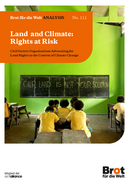
Analysis 111: Land and Climate - Rights at Risk The study shows how carbon trading projects in (...) The study shows how carbon trading projects in Papua New Guinea are affecting the land rights of indigenous and local communities and how they are defending their rights together with civil society (...) The study shows how carbon trading projects in Papua New Guinea are affecting the land rights of indigenous and local communities and how they are defending their rights together with civil society organisations. |
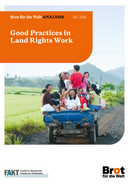
Analysis 104: Good Practices in Land Rights Work All over Southeast Asia and the Pacific, people (...) All over Southeast Asia and the Pacific, people from poor communities are under pressure of losing their land. This report puts its focus on good practices in the land rights work of civil society (...) All over Southeast Asia and the Pacific, people from poor communities are under pressure of losing their land. This report puts its focus on good practices in the land rights work of civil society organisations. |

Analysis 97: Conflict Dynamics and the Belt and Road Initiative Ignoring Conflict on the “Road to Peace” Ignoring Conflict on the “Road to Peace” Ignoring Conflict on the “Road to Peace” |
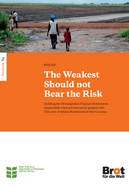
Analysis 64: The Weakest Should not Bear the Risk Following the financial and food crisis in 2008 (...) Following the financial and food crisis in 2008 the phenomenon of land grabbing through large-scale investments in land leading to forcible displacement of rural population, increasing their food (...) Following the financial and food crisis in 2008 the phenomenon of land grabbing through large-scale investments in land leading to forcible displacement of rural population, increasing their food insecurity and disregarding Human Rights became a hot topic on the global agenda. The most important question is which sort and form of investment is needed and by whom? |
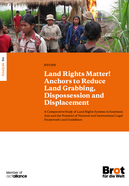
Analysis 60: Land Rights Matter! Anchors to Reduce Land Grabbing, Dispossession and Displacement A Comparative Study of Land Rights Systems in (...) A Comparative Study of Land Rights Systems in Southeast Asia and the Potential of National and International Legal Frameworks and Guidelines A Comparative Study of Land Rights Systems in Southeast Asia and the Potential of National and International Legal Frameworks and Guidelines |
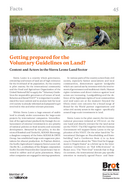
Facts 45: Getting prepared for the Voluntary Guidelines on Land? Context and Actors in the Sierra Leone Land Sector Context and Actors in the Sierra Leone Land Sector Context and Actors in the Sierra Leone Land Sector |

Analysis 43: Land Acquisitions and Their Impacts on Peace, Security and Stability This report reveals the links between land (...) This report reveals the links between land acquisitions, human rights abus-es, violence and long-term conflicts, with reference to various country case studies. It identifies areas where ac-tion is (...) This report reveals the links between land acquisitions, human rights abus-es, violence and long-term conflicts, with reference to various country case studies. It identifies areas where ac-tion is needed and draws conclusions of relevance to further practical and political work on land, investment and food security. Its aim is to raise awareness of the need for conflict-sensitive action and for consideration of the long-term implications for peace and conflict. |
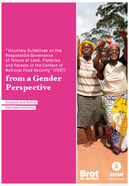
VGGT from a Gender Perspective Women need access to productive resources, (...) Women need access to productive resources, education, health, income and employment in an environment free of violence in order to realise their human rights and attain gender equality. Considering (...) Women need access to productive resources, education, health, income and employment in an environment free of violence in order to realise their human rights and attain gender equality. Considering the importance that secure land and property rights have for the lives of women and girls, Bread for the World and Oxfam welcome the fact that the “Voluntary Guidelines on the Responsible Governance of Tenure of Land, Fisheries and Forest in the Context of National Food Security” (VGGT) address gender equality. In this study a gender perspective is applied to the guidelines and the connections regarding gender issues are identified. The study provides evidence that the guidelines acknowledge the importance of gender equality in land tenure in all activities related to the responsible governance of tenure. |

Land and Conflict Prevention How integrated solutions can help achieve the (...) How integrated solutions can help achieve the Sustainable Development Goals How integrated solutions can help achieve the Sustainable Development Goals |
